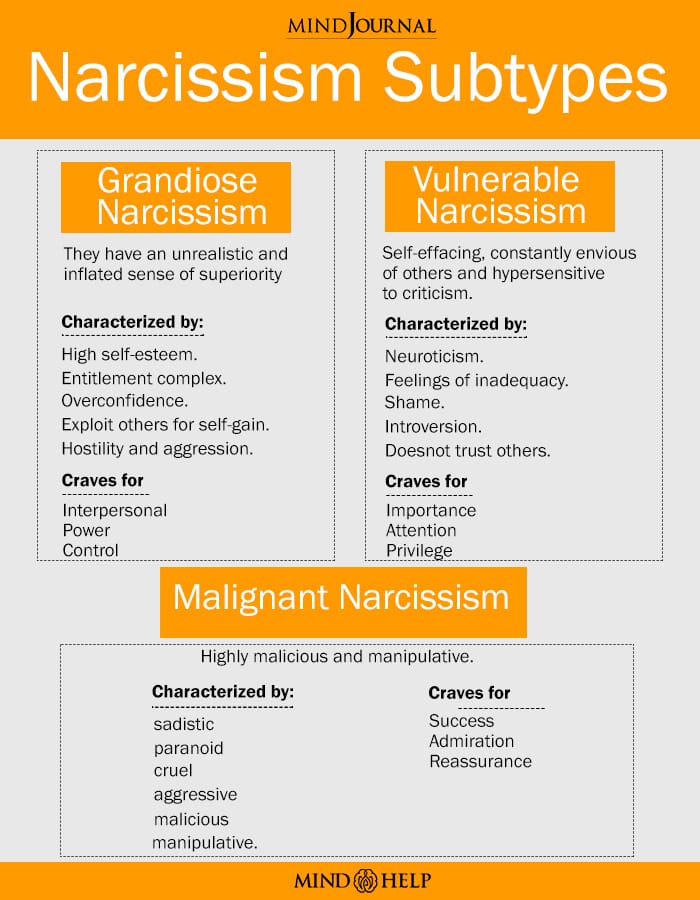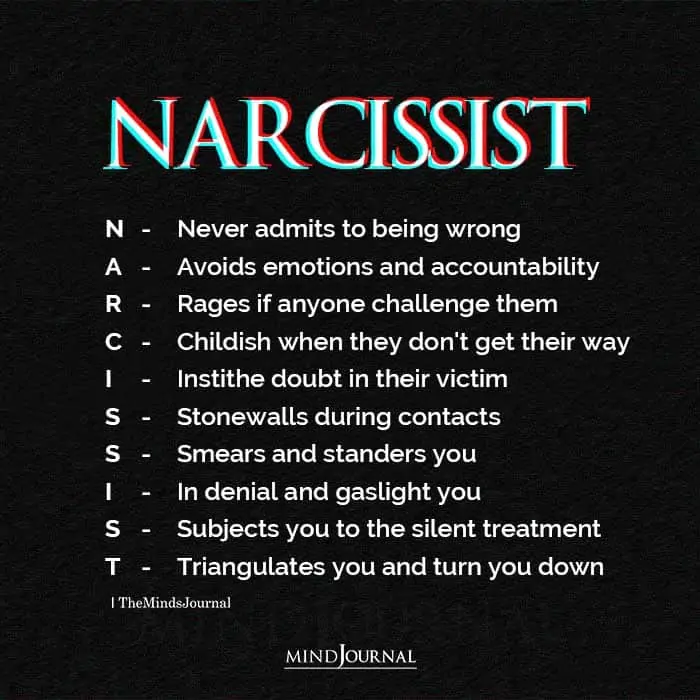Maybe it was your best friend, who, while consoling you after a bad breakup had spitefully uttered the term “malignant narcissist” to you, taking a dig at your ex-partner. But malignant narcissistic personality disorder isn’t something you can arbitrarily assign to anybody.
Malignant narcissism is a toxic and vile personality trait. However, people with a malignant narcissistic personality disorder are master manipulators of emotions who can successfully guise themselves and fly under the radar undetected. So, what is a malignant narcissistic personality disorder, and why is it so hated?
Malignant Narcissistic Personality Disorder Definition

The malignant narcissistic personality disorder is not a recognized mental illness according to the DSM-5, but is an umbrella term to describe people who exhibit symptoms and traits of both antisocial personality disorder and narcissistic personality disorder.
What Are The Symptoms Of Malignant Narcissistic Personality Disorder?
Malignant narcissistic personality disorder symptoms are but a combined effect of both the above-mentioned personality disorders and can manifest as:
- Self-centeredness
- Arrogance
- Disregard for others’ emotions and needs
- Manipulation or exploitation of others for personal gains
- Feeling of superiority
- Hunger for power
- Vindictiveness
- Fantasizing about exerting control over others
- Lack of conscience
- Tendency to derive sadistic pleasure by hurting
- Extreme aggression
- Severe paranoia
Read 5 Things Narcissists Do To Be The Center Of Attention
How Do You Tell You’re Dealing With A Malignant Narcissist?
Now let’s see how these symptoms of the malignant narcissistic personality disorder get transformed into behavioral traits.
1. Lies
A malignant narcissistic personality will lie through their nose to avoid accountability. They have mastered the art of skillful deception and know very well how to dodge your probing questions, divert your attention to some other topic, and serve you concocted stories. They will refuse the truth, even when it’s lying in plain sight, and convince you to accept their side of the story, no matter how unbelievable it may be.
2. Betrayal
A person with a malignant narcissistic personality disorder will go back on their words often. They will promise you the moon but will vanish in thin air to avoid any kind of commitment. Social obligations, romantic emotions, law, or moral conduct mean nothing to them. Moreover, they will play the blame game and accuse you of not keeping up your end of the agreement.
3. Workplace Bully
The toxic people with a malignant narcissistic personality disorder can be your worst nightmare at your workplace. These charismatic smooth talkers know how to rise up the corporate ladder by stepping on others’ shoulders. They unabashedly fake their capabilities, ruthlessly abuse their power and can exploit, manipulate, or squash anyone to achieve their goals. Backstabbing and bullying are the most preferred choice of tools for a malignant narcissist.
4. Sexual Predation
Someone with a malignant narcissistic personality disorder is most likely to be hyper-sexual and can target any vulnerable victim for sexual gratification. Such people often indulge in sexual behaviors that are risky, questionable, and objectionable. Incest, pornography, sadism, coercion, nothing is too much for a malignant narcissist.
5. Violence
Another sign of malignant narcissistic personality disorder is unwarranted aggression or violence. A malignant narcissist has no impulse control and always fears they are about to be cheated or betrayed by others. They assume the worst in everyone and tend to lash out without the slightest provocation. They often violate boundaries and physically hurt others in a feat of rage.
6. Manipulation
People with malignant narcissistic personality disorder can twist their words, play with emotions, and pit people against each other. They have no reservation to come off as a poor fellow, as long as they can exploit their target for financial, sexual, or any other kind of favors. Malignant narcissists often alienate their victims by creating misunderstandings and cutting them off of their family, friends, and other support systems.
7. Sadism
Malignant narcissists like to inflict pain and they derive pleasure from seeing others suffer. The torment can be financial, emotional, verbal, physical, or sexual, but the common objective always remains the same; to take others’ happiness or assets and watch them dangle helplessly.
8. Emotional Blackhole
The victims of a malignant narcissist sooner or later discover that their tormentor is devoid of any human emotion. People with malignant narcissistic personality disorder are incapable of connecting with another human being on an emotional level. They lack empathy and can never fathom to which extent their narcissism hurts others. A malignant narcissist can never feel remorse or regret, as they have no conscience.
9. Boastfulness
Crafting a fake image is a signature style of people with a malignant narcissistic personality disorder. They are always mindful of how the world must perceive them and this is why they painstakingly maintain a fake image of grandeur. A malignant narcissistic personality will not think twice before putting up their kids or spouses as a prized possession. They will be always boastful of their achievements and pretend to be more successful and well put together than they really are.
10. Paranoia
As mentioned before, a malignant narcissistic personality may suffer from severe paranoia all the time. They are suspicious of everyone and constantly live with a fear that their toxic narcissistic traits will get exposed.
However, one difference between malignant narcissism and narcissistic personality disorder is that not all those who have a malignant narcissistic personality disorder suffer from paranoia. That being said, malignant narcissists can get dangerous when rattled and prefer to leave before they are left. But before leaving they leave scars that take a long time to heal.
Read: 10 Manipulative Strategies Used By Narcissists To Dominate You
Some Other Traits Of Malignant Narcissistic Personality Disorder May Include:
- Substance abuse
- Covert narcissism
- Thrill-seeking
- Hypocrisy
- Fake honesty
- Feigning remorse
What Causes Malignant Narcissism?
All mental health and personality disorders are believed to arise from a perilous mix of genetics, dysfunctional environments, and personal temperament. Some research says people with a malignant narcissistic personality disorder have an anomaly in their brain structure.
Other non-genetic factors that are often found responsible for a malignant narcissistic personality disorder include:
- Traumatic experiences of abuse and/or neglect
- Severely criticized and pushed beyond limits as a child
- Getting excessive praise and attention during childhood
- Being bullied or ridiculed in early life
- Growing up under a caregiver with narcissistic traits
- Punished as a child for failing to meet unrealistic expectations
- Dysfunctional family life
How To Deal With A Malignant Narcissist
If you realize you are dealing with someone who has a malignant narcissistic personality disorder, running for the hills is the wisest move. But if for some unavoidable circumstances you are unable to do so, the following tips might prove to be helpful:
- Don’t expect them to be fair, in fact, don’t expect anything from them
- Try to minimize your interactions with them and keep your communications short and superficial
- Don’t open up and show your vulnerability
- As long as you feed their ego, they will not turn on you
- Identify their tactics such as blame, praise, threats, etc. and manage your emotions accordingly
- Anticipate what they want from you, decide whether you want to oblige and if not, then lay clear boundaries
- Avoid triggering their insecurities and fears

Love Yourself Enough
Remember that no relationship in this world should come at the expense of your dignity, sanity, and mental health. If someone is causing you emotional, physical, or financial duress, seek help through proper channels. You might want to get the authorities involved if your safety is at risk.
Speaking to a mental health professional or a relationship coach might also help, depending on the severity of your situation.
So did you find our article on Malignant Narcissistic Personality Disorder helpful? If you have any more questions on this topic or want to share your story, don’t hesitate to comment down below.
Frequently Asked Questions
Can malignant narcissists love?
No, malignant narcissists are devoid of empathy and incapable of attuning to emotions
Do malignant narcissists know what they are doing?
Both yes and no. Malignant narcissists are aware of their behavior but they cannot fathom its impact.
Why are narcissists so paranoid?
Pathological narcissism gives birth to paranoia. In simple terms, narcissists are afraid of getting exposed.
Are all manipulators narcissists?
No, all manipulators are not narcissists but all narcissists are master manipulators.
What is a malignant narcissistic personality disorder?
A malignant narcissistic personality disorder is a subtype of narcissistic personality disorder and its symptoms are also common with an antisocial personality disorder.









